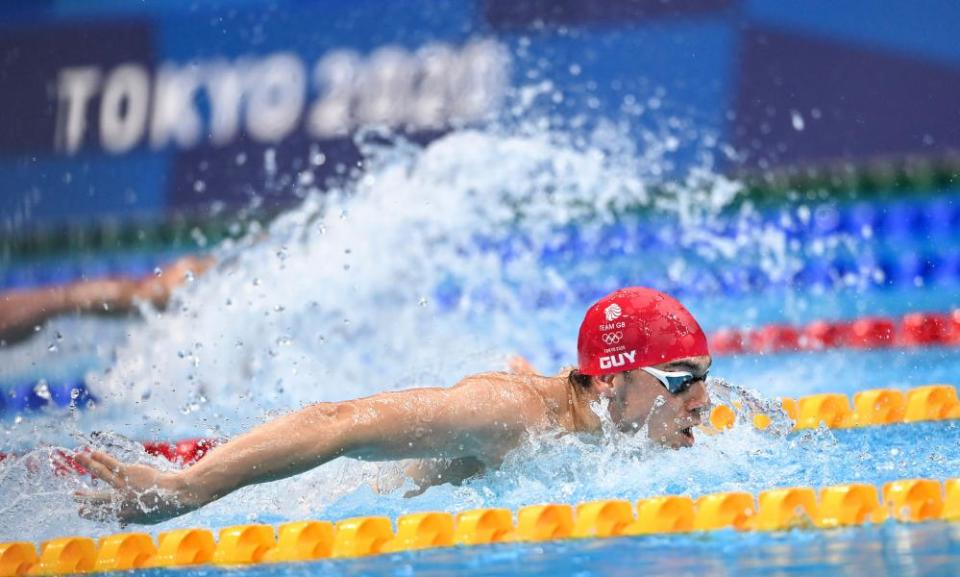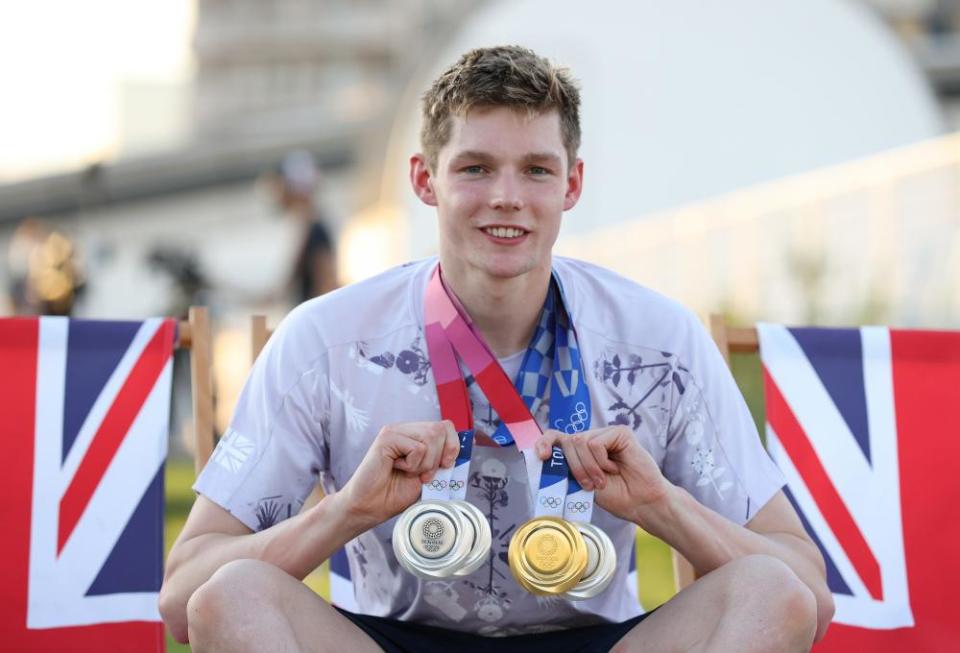‘We are upset to come second’: how culture change lifted GB swimming

James Guy leant back against the wall, too tired to think, too tired to talk. Guy swam seven races in the past five days, the last of them, the butterfly leg of the men’s 4x100m medley relay, just an hour earlier. It had been one of the hardest, and most intense races of his life, and they had lost it to the USA. Now the media wanted to ask him and his teammates all those familiar questions about how it felt, and whether he was disappointed or not. Guy’s usually happy to prattle but this time he closed his eyes, let his teammates do it for him. Until someone asked a question that got his attention.
It was about how the culture of British swimming has changed in recent years. Guy is 25, which makes him one of the senior figures on this young team, and he wanted to tell a story which he thought summed it all up. “Eight years ago I made the senior team for the first time,” Guy said, “and I remember at my first world championships, every day we’d have a team meeting, and in it we’d all clap for whoever had made a final that day.” He laughs at it now. “And here we are, we’ve got second, and we’re upset with that, and that shows you the way things have moved on.”
Related: ‘It’s not really hit me’: Duncan Scott struggles to grasp winning four medals
That’s how it used to be in British Swimming, says Adam Peaty, “like people were happy just to be there”. That’s the way it was in 2012. The Olympic pool was a pretty depressing place to spend those Games if you wanted to see British athletes succeeding. Michael Jamieson won a silver, Becky Adlington won a pair of bronze medals, and there were what seemed a string of fourth-, fifth- and sixth-place finishes, all talking about how delighted they were to be in an Olympic final. It was a similar story at Atlanta 1996, Sydney 2000 and Athens 2004, too.
And now, here they are, third in the swimming medal table behind the USA and Australia. They won eight medals this past week, which made it the most successful Olympics the team have had.
It was after London that things really started to change. Adlington’s mentor, Bill Furniss, took over as the head coach of British Swimming and Chris Spice, who had a background in hockey and basketball, became the performance director. “For me, the big stat from London was that only 20% of our team swam their season’s best for the year at the Games,” Spice says. “So when I started I could see that we could swim fast, but we couldn’t swim fast when it matters.” He brought in people from outside swimming, sport scientists, data analysts, and leadership coaches, to help him to create what he describes as “a culture that builds belief and self-confidence in the arena”.
Spice also set about streamlining the swimming programme. He cut the size of the national squad in half, so they could concentrate their limited resources on their most talented swimmers, and moved from five national training centres down to two, at Bath and Loughborough, with extra regional bases in Swansea and Stirling. He was criticised both times. “We had a lot of good swimmers but they were scattered across the country,” Spice says. “And if we were going to target resources, that set-up wasn’t going to work.” When he started 30% of their swimmers were training in those national centres, now 80% are, “and they get the absolute best support we’ve got”.

They also started developing their Talent ID programme. “We have 60 million people in Britain but only 40,000 swimmers,” Furniss says. “You go to the USA, they have 450,000 swimmers. So it is a numbers game. And what we have to do is pick the right ones and then put the resources into them, otherwise you can quickly put a lot of money and resources down a black hole and it never comes back.”. Spice says that they only get “five or six good ones a year” so “we have got to make sure that we get them in the right palace, with the right coach and the right programme”.
Behind all the talk, there’s also the straightforward truth that they were plain lucky when Peaty turned up in 2014. Almost every other swimmer in the team has spoken about how important Peaty’s influence is. You could see it after the 4x100m medley final. Like Guy said, he, Peaty, Luke Greenbank and Duncan Scott were bitterly disappointed with that silver, even though the USA finished in a world record of 3min 26.78sec. Great Britain are world champions in the event, and were sure this was their chance to become the first team in Olympic history to beat the USA in it.
Related: Team GB smash world record to win Tokyo 4x100m mixed medley relay gold
“Adam is a trailblazer, his attitude is world class every day,” Furniss says. “The public see him swim here, but they don’t see the other 365 days a year, of total commitment, but all the other swimmers on the team do.” Five years ago, they had identified Tom Dean, who won the 200m freestyle last week, as someone they wanted on their elite programme. But both Dean’s sisters had taken up college scholarships in the USA, and they were worried Dean would do it too. So they sent Peaty along to try to persuade Dean that he would be better off staying in Britain. It worked.
Peaty talks a lot about the bonds between the British swimmers, he calls it “the brotherhood”. They cheer for each other in victory, support each other in defeat, and they follow Peaty’s lead. “I’m incredibly proud to be part of this team, it’s history making. We are always looking for gold, always looking for world records. We are aiming for gold, we are aiming to be the best in the world.” Listening to him, watching them swim, London seems a lot longer than nine years ago.

 Yahoo Finance
Yahoo Finance 